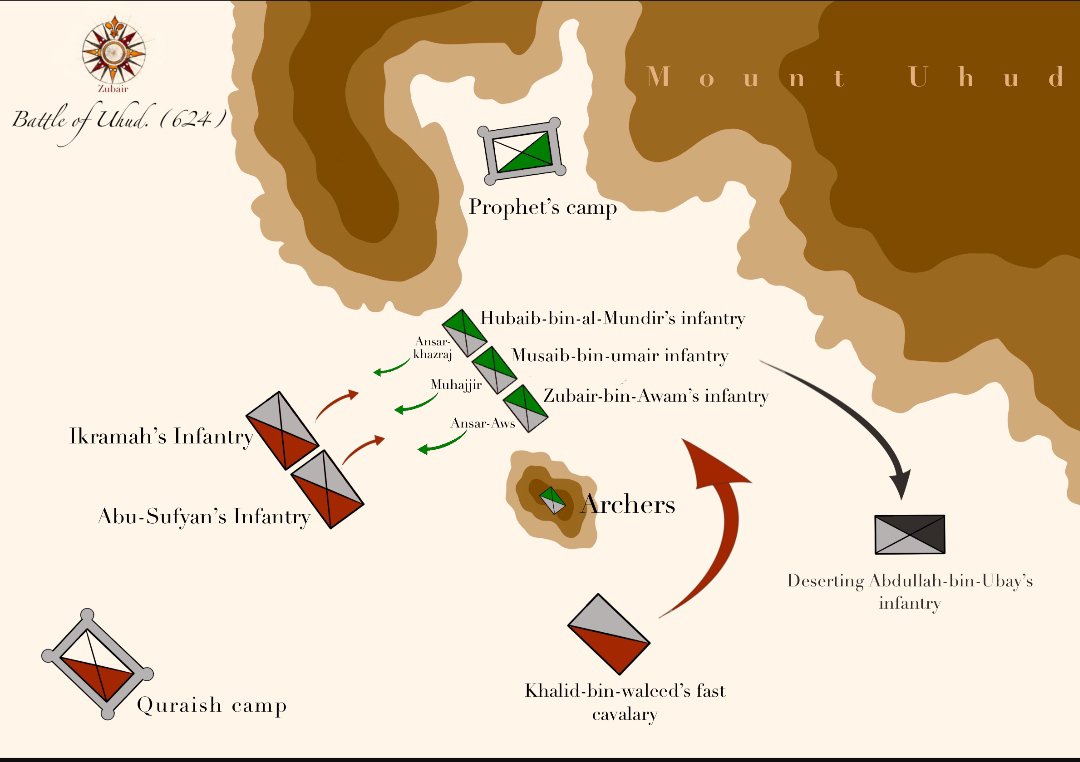“If you want to fast, go alone. If you want to go far, go together.”
Bismillah,
The Battle of Uhud, fought in 625 CE, was a pivotal event in early Islamic history.
Taking place near Mount Uhud in Medina, it was the second major battle between the Muslims, led by Prophet Muhammad (PBUH), and the Quraysh of Mecca.
The Battle Begins
Following the stunning victory at the Battle of Badr, the Quraysh sought revenge against the Muslims.
They amassed a larger army, approximately 3,000 strong, to attack the Muslim community in Medina.
The Muslims, numbering around 700, prepared to defend their city under the leadership of the Prophet Muhammad (PBUH).
The Prophet’s strategy was to position his troops at the base of Mount Uhud, with the hill behind them and a strategic passage held by 50 archers.
He ordered the archers to hold their position and not leave under any circumstances.
Early Muslim Success
The battle began favorably for the Muslims.
Their defensive position and strategic planning allowed them to make significant gains against the Quraysh forces.
The Quraysh were on the verge of retreat, and victory seemed imminent.
The Turning Point
However, the tide turned when the archers disobeyed the Prophet’s orders.
Seeing the Quraysh retreat and the battlefield littered with spoils, many of the archers left their posts to collect the spoils of war.
This left a crucial gap in the Muslim defenses.
Khalid ibn al-Walid, who was not yet a Muslim, saw this opportunity and led a cavalry charge through the unguarded passage, striking the Muslim army from the rear.
The Muslims were caught off guard, and the battle descended into chaos.
The Prophet’s Injury
In the ensuing confusion, the Prophet Muhammad (PBUH) himself was injured.
A blow to his face caused him to lose a tooth, and he bled from his wounds.
Despite this, he remained steadfast, urging his companions to regroup and hold their ground.
His (PBUH) resilience became a source of inspiration for the Muslims during this critical moment.
Aftermath and Lessons
The Battle of Uhud ended in a significant loss for the Muslims, with many key figures, including the Prophet’s uncle, Hamza ibn Abd al-Muttalib (RA), becoming martyrs.
However, despite the losses, the Quraysh did not press their advantage to attack Medina directly, allowing the Muslims to regroup and recover.
The Battle of Uhud served as a powerful lesson in obedience, discipline, and resilience.
The Prophet (PBUH) emphasised that disobeying commands, especially in critical situations, can lead to disastrous outcomes.
It also highlighted the importance of unity and resilience in the face of adversity.
Conclusion
The Battle of Uhud, though a defeat on the battlefield, was a spiritual and moral victory for the Muslims.
It taught the Muslim community invaluable lessons about leadership, sacrifice, and obedience to divine commands.
The battle remains a reminder that victory is not always about immediate success but about staying true to one’s principles, even in difficult times.
So let us reflect on this event.
May Allah (SWT) make the Ummah united and resilient towards our enemies.
Ameen!
